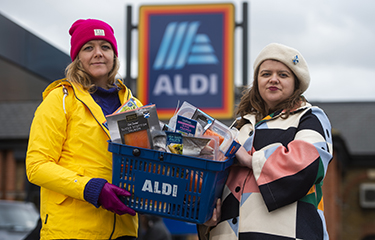U.K. shoppers are consuming around two-and-a-half times more wild fish than they think, according to a new report, which also ranks the nation’s top 10 supermarkets according to the sustainability of the farmed seafood that they sell.
Published by the Changing Markets Foundation and environmental campaign group Feedback, the report “Caught out: How U.K. retailers are tackling the use of wild fish in their aquaculture supply chains,” states that the major chains are failing in their responsibility to protect the oceans, as seven out of the 10 supermarket chains received less than 30 percent on the fish feed sustainability scorecard.
Aldi finished bottom of the list at 12 percent, Waitrose received 22 percent, and only Tesco achieved a score above 50 percent.
The report also calculates that U.K. shoppers indirectly and unknowingly consumed 177,000 metric tons (MT) of wild fish in 2019 by eating the top six farmed fish species including salmon and shrimp, because they are fed on fishmeal and fish oil.
That equates to a “hidden” 172 of wild fish consumed for every 100 grams of farmed fish eaten, almost all of which could have been eaten directly by people, it said.
“Supermarkets have enormous power over supplier standards and the choices their customers make, and seafood selection is no different,” Feedback Head of Policy and Communications Jessica Sinclair Taylor said. “By prominently marketing farmed seafood like salmon and prawns which are fed on wild fish and crustaceans, retailers are promoting an extractive industry which is threatening the long-term health of our oceans. Behind the blue planet rhetoric, supermarkets need to get real about the impact of aquaculture, and commit to targets to end the use of wild fish in aquaculture feed.”
Changing Markets Campaign Manager Natasha Hurley said that while U.K. supermarkets make bold claims about the sustainability of the farmed fish that they sell, its research has found that these claims are not backed up by the reality of how their farmed fish is produced.
“Our investigations have shown that the U.K.’s leading retailers are linked to highly destructive fishing practices in Africa and Southeast Asia which are devastating marine ecosystems and depriving people of food,” Hurley said. “U.K. shoppers will be shocked to learn that for every 100 grams of farmed fish they are eating, they are consuming more than 172 grams of wild fish as well, which is taking food away from vulnerable communities and causing disastrous environmental impacts.”
Hurley said retailers in the U.K. need to do more to alert consumers.
“By turning a blind eye to this, retailers are both failing in their responsibility to preserve the oceans and misleading their customers by hiding the true impact of their products,” Hurley said.
In addition to scoring U.K. retailers on their sourcing policies and marketing approaches with regards to farmed fish, the report called on them to take the following actions:
- Phase out the use of fishmeal and fish oil sourced from wild-caught fish in their aquaculture supply chains by 2025 at the latest;
- Commit to offering a wide range of seafood – including a greater diversity of sustainably caught wild fish and farmed seafood that doesn’t rely on wild fish in feed, such as mussels;
- Adopt high standards of transparency and corporate policy on their suppliers, including full disclosure of suppliers – from source fisheries upwards;
- Reduce reliance on certification as a proxy for sustainability by developing their own robust and transparent standards for sustainably produced seafood, including farmed seafood.
Additionally, the report urges consumers to:
- Diversify their consumption of seafood to include a wider range of sustainably fished wild species, as well as farmed species (such as mussels) that do not rely on feed containing fishmeal and fish oil;
- Stop buying farmed salmon and shrimp until products are available that incorporate sustainable alternatives to wild marine ingredients;
- Show companies they care by contacting retailers requesting higher standards on farmed seafood.
Photo courtesy of the Changing Markets Foundation and Feedback







